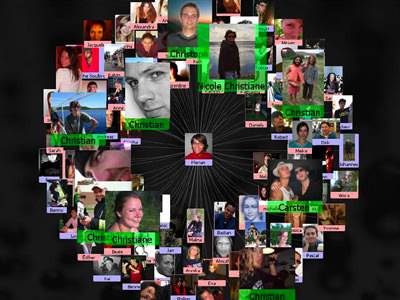Here is a summary of the week’s Web Tech action on Read/WriteWeb. Note that you can subscribe to the Weekly Wrapups, either via the special RSS feed or by email.
Web Products
Google Apps Goes After Enterprise Market
This week Google announced a partnership with major IT consultancy and outsourcing specialist CapGemini, to sell Google Apps to enterprises. CapGemini, which is also a partner of Microsoft and IBM, aims to “mix and match” Microsoft and Google office products. So it seems Google Apps will be a complement, moreso than a replacement, for Microsoft Office. Robert Whiteside, Google enterprise manager for UK and Ireland, is quoted as saying: “If you look at the traditional desktop it is very focused on personal productivity. What Google Apps brings is team productivity.”

See also the responses from Microsoft and Zimbra:
- Microsoft Issues 10 Reasons Why Enterprises Shouldn’t Use Google Apps
- Zimbra: Google Apps Not Quite Ready For Enterprise
Finally, a note that Google’s powerpoint competitor is rumored to be released next week – under the brand name Presently.
deliGoo Mashes Google with del.icio.us
Our Web product of the week is deliGoo, a nifty new add on for Firefox 2.0+ and IE 6.0+ that mashes up del.icio.us with Google Custom Search. The way it works is by creating a Google Custom Search engine based on all of a user’s del.icio.us bookmarks, all of the bookmarks under a single tag, or all of the bookmarks under a single tag from a single user.

You can find many other startup profiles in our Startups category.
Analysis
Social Graph: Concepts and Issues
Alex Iskold explored the meaning of the Social Graph, a term used by Facebook to describe their social network. Alex took as his starting point a post by Brad Fitzpatrick, who defined “social graph” as “the global mapping of everybody and how they’re related”. One problem, wrote Alex, is that currently you need to have different logins for different social networks. Another issue is portability and ownership of an individual’s information, explicitly and implicitly revealed while using social networks. As was recently asserted in the Social Bill Of Rights and as has been advocated for a while by Attention Trust Principles, users want to own their personal information – including their chunk of the Social Graph.

10 Ajax Start Pages to Consider
Ajax start pages are easy-to-use, customizable webpages, allowing you to keep up with the latest news and add interactive content. You can add new RSS feeds and widgets, and move your content around the page. In some ways start pages are the successors to the portals of the 90’s. They have yet to break into the mainstream, however the promotion of iGoogle and the presence of MyYahoo are facilitating the transition. This post by Aidan Henry explored some of the top players – and also some you may not have been aware of.

You can find more R/WW analysis posts here.
Non-Profits Week
This week we focused on non-profits and here were our top posts:

Josh Catone looked at what web-based tools exist to make running and organizing a non-profit or charity organization easier. It turns out, there are many of them. He organized the cream of the crop into a very useful tool kit – including tools to create a website, get the word out, fundraise, and much more.
Non-Profits & Web 2.0: Notes From The Real World
Guest author Beth Kanter provided R/WW readers with an inside look at non-profit Web activity in the real world. For example, Beth recently went to Cambodia to take part in a blogging summit there. If you want to find out how web technology is being utilized outside the much hyped consumer sector, we highly recommend you read Beth’s post.
R/WW Network Blogs
last100
Check out a wrap of the week’s Digital Lifestyle news on last100. Their main feature post this week was a comprehensive look at the Internet streaming efforts of the big five U.S. television networks: ABC, CBS, NBC, Fox, and The CW. last100 concluded that the online offerings of the big 5 remain sporadic and their Internet strategies feel like Äúwe have toÄ? rather than Äúwe want toÄ?.

Alt Search Engines
Our other network blog AltSearchEngines asked this week: can a search startup take on the Google juggernaut? According to the post, a trio of small, well-funded startups are taking divergent approaches to break into this area of general-purpose web search: Powerset, of San Francisco, CA, is licensing technology originally from Xerox PARC to tackle the problem of Semantic Search; Mahalo, of Santa Monica, CA, is at work on a “human-powered” search engine; and Quintura, originally from Russia and now based in Alexandria, VA, is creating an effective “see-and-find” visual search engine for the web.

Read/WriteTalk
This week Sean Ammirati of Read/WriteTalk – our new podcast show – sat down with Bradley Horowitz, VP of the Advanced Development Division Yahoo! They discussed two hacks that were launching after being conceived at their internal hack day on March 23rd. They also discussed the ‘hack ethic’ inside of Yahoo.

Poll
Our poll this week asked:How often do you donate to charities or non-profits online? Here are the results:
—
About once a week 2% (4 votes)
About once a month 9% (18 votes)
Every now and then 19% (37 votes)
Not regularly, but I donate large amounts 4% (8 votes)
Rarely 24% (46 votes)
Never 42% (81 votes)
—
66% said that they rarely or never donate online. The next highest vote was 19% for “every now and then”.
That’s a wrap for another week! Enjoy your weekend everyone.

















